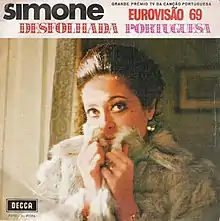Desfolhada portuguesa
Desfolhada portuguesa ("Portuguese husking"), or simply Desfolhada is a song recorded by Portuguese singer Simone de Oliveira. The song was written by Nuno Nazareth Fernandes and Ary dos Santos. It is best known as the Portuguese entry at the Eurovision Song Contest 1969, held in Madrid. The song was introduced in the Contest as Deshojada in Spanish titles when broadcast because in that last language the word Desfolhada is similar to an obscene word.
 | |
| Eurovision Song Contest 1969 entry | |
| Country | |
| Artist(s) | |
| Language | |
| Composer(s) | Nuno Nazareth Fernandes |
| Lyricist(s) | |
| Conductor | Ferrer Trindade |
| Finals performance | |
| Final result | 15th |
| Final points | 4 |
| Entry chronology | |
| ◄ "Verão" (1968) | |
| "Menina do alto da serra" (1971) ► | |
The song deals with the love of Portugal - the first occasion on which this was the theme of the Portuguese entry, but far from the last. The song compares the love from the conception of a child to patriotic love.
The song was performed fifteenth on the night, following France's Frida Boccara with "Un jour, un enfant" and preceding Finland's Jarkko & Laura with "Kuin silloin ennen". At the close of voting, it had received 4 points, placing 15th in a field of 16.
Portugal opted out of the 1970 contest, one of the many countries to withdraw after the chaotic 1969 result where four songs tied for first place. The entry, however, had been selected at the time the withdrawal was made, so the country would have been represented by Sérgio Borges with "Onde vais rio que eu canto".
Following the return to the traditional set-up in 1970, Portugal returned to the contest. Thus, the song was succeeded as Portuguese entry at the 1971 contest by Tonicha with "Menina do alto da serra".